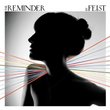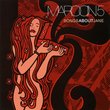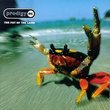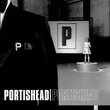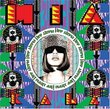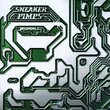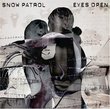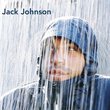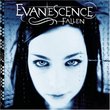| All Artists: Portishead Title: Third Members Wishing: 8 Total Copies: 0 Label: Mercury Original Release Date: 1/1/2008 Re-Release Date: 4/29/2008 Genres: Dance & Electronic, Pop Styles: Electronica, Trip-Hop, Adult Alternative Number of Discs: 1 SwapaCD Credits: 1 UPCs: 602517664005, 0602517640139, 0602517664005, 0602517664012, 602517640139, 602517664012 |
Search - Portishead :: Third
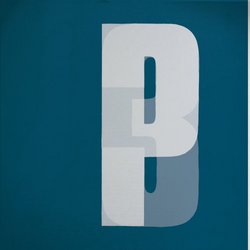 | Portishead Third Genres: Dance & Electronic, Pop
Portishead's Third has been a long time coming, the result of a lengthy creative torpor following 1997's dark, distinctly underrated album Portishead. Importantly, though, they've shaken it. While the core trio of Beth Gib... more » |
Larger Image |
CD DetailsSynopsis
Amazon.co.uk Portishead's Third has been a long time coming, the result of a lengthy creative torpor following 1997's dark, distinctly underrated album Portishead. Importantly, though, they've shaken it. While the core trio of Beth Gibbons, Geoff Barrow, and Adrian Utley remains, this is quite a different band to Portishead's 90s incarnation: gone is the slo-mo turntable scratching and smoky jazz feel, replaced by heavy, brooding rhythms, vintage-sounding electronics, and spindly guitar. Still present, though, is that sense of emotional fracture and deep gloom. "Silence" opens with a dense drum loop which suddenly falls away to reveal Gibbons' voice, cold but magnificent: "Wounded and afraid, inside my head/Falling through changes". "Nylon Smile", meanwhile, is a fine example of Third's occasional folksy edge, an acoustic song reminiscent of Leonard Cohen that, around its midpoint, lifts off on a propulsive electronic rhythm, Gibbons holding one clear, hard note as synthesisers bubble beneath. At times, it's a harsh and foreboding listen: the electronic drums of "Machine Gun" might put off the listener hoping for smooth dinner party fare. But Third is a brave and forward-thinking return, and one great enough to justify its lengthy gestation. --Louis Pattison Similar CDsSimilarly Requested CDs
|
CD ReviewsThird Mike Newmark | Tarzana, CA United States | 04/29/2008 (5 out of 5 stars) ""We really wanted to sound like ourselves but not sound like ourselves. It was always going to be difficult." - Geoff Barrow, Pitchfork Media interview, Apr. 7, 2008. Geoff Barrow and the rest of Portishead had every reason in the world to feel this way. When Dummy debuted in 1994, it didn't sound like anything else and wasn't even expected to sell 50,000 copies. It's hard to believe in this day and age, but Dummy's dark, torchy pop punctuated with hip-hop beats and swimming in a sea of bass had never before been co-opted by anyone--not even Massive Attack, who had approached trip-hop from more of a dance perspective. It blew up, sparking a trip-hop genesis in alt-rock circles looking for a viable (and similarly angst-ridden) alternative to grunge, especially in the States. Now, of course, Dummy's sound is everywhere, from the umpteen upstart trip-hop bands that subsequently appeared to spy films, cocktail parties and massage therapy commercials. So we would be forgiven for not being bowled over by Dummy today, and Portishead would be forgiven for wanting to distance themselves from it. When last we heard from Portishead, it seemed as though they were packing it in for good, leaving us with a slightly less fresh self-titled album in 1997 and a live recording at Manhattan's Roseland Ballroom in 1998 before retreating into the shadows. Always something of an enigma and quite shy of the press, it was left to us to assume that Portishead was frustrated with how their crown jewel had been assimilated and watered-down, and that they were too daunted by the challenge that Barrow mentioned above to record a third album: How do you sound like yourself and not sound like yourself? All of which makes Third--a record that wasn't even supposed to exist--such a cryptically dazzling triumph. Third is no Dummy: It's much bleaker, makes precious few references to pop, and attains a level of creepiness that Dummy's strangest song, "Wandering Star," only suggested. Yet one listen to Third is all it takes to realize that nobody else is making music quite like this, and this is how Portishead still sound like themselves. In fact, hearing Third in 2008 may clue us into what it was like to hear Dummy in 1994. Counterintuitive as it may seem, the first thing to do when approaching Third is to forget about trip-hop and all the associations it carries. Barrow's drums stay far, far away from a hip-hop swagger; rather than providing a backbone, these diverse rhythms teeter on edge with the rest of the music and add another ominous layer to the mix. "Plastic" uses amped, clipped drum rolls that send the song screeching to a halt about a dozen times, and "We Carry On" is driven by a scary tom-led tribal stomp (Morcheeba this isn't). Barrow doesn't cop out by adding bassy undercurrents for cheap mystery; instead, he punches up the compression and keeps the sound trebly and brittle, giving the impression that everything is flying right at you even when the songs stand still. Third may be stubbornly unsexy, but that doesn't mean it's not alluring. Indeed, it wields an odd magnetic power that draws the listener ever further into its disorienting abyss, even when all of the elements jump bluntly out of the speakers. By the same token, Third's allure doesn't make it an easy listen, and it can be particularly heady when experienced in one straight pass. The sequencing feels all wrong, moving up and down and up again in the most unsettling of ways. After the distorted anti-song "Silence" kicks the record off, Portishead dips into the heavily narcotized haunted house of "Hunter," where Beth Gibbons' vocals drift sleepily and hypnotically through the arrangement. "We Carry On" is followed by the 90-second respite "Deep Water," which sounds like Gibbons fronting the Ink Spots over a ukulele melody, before being gunned down by the incessant staccato rapid-firing of "Machine Gun." Through it all, Gibbons sings like an innocent bystander; divorced from and frightened by the music around her, she becomes our stand-in for its unfamiliar territory. She contributes little to the record compositionally and melodically, but remove her and obliterate a sizable chunk of Third's emotional punch. The members of Portishead are noted experimentalists, but they don't just make cool sounds for fun. The backward-looped guitar on "Nylon Smile," the warped ascending scales on "Hunter," and the many other weird noises that crop up on Third contain an element of caution like aural barbed wire: As unpleasant as they may be, they're there to keep us from venturing somewhere truly dangerous. The creepy Portuguese television program that begins "Silence" seems appropriate, since listening to Third can feel as though we're tuning into a channel that we're not meant to know about or watch. I imagine that trip-hop in its nascent form--Massive Attack's Mezzanine, Tricky's Maxinquaye, and yes, Portishead's Dummy--was originally meant to invoke this sort of forbidden underworld, but that somewhere down the road the plot got lost, and its darkness and foreboding turned into something more manageable, fashionable and marketable. By rescuing trip-hop from a fate of Banana Republic soundtracks and putting their extremely personal stamp on a tired genre, Portishead have re-established themselves not simply as masters of their craft, but as reinventors of it." Portishead's Third - At Long Last, They're Back! Mark | East Coast | 04/29/2008 (5 out of 5 stars) "Third The last few years have been really good to me in terms of new music that I can listen to, but no group has been able to fill the void left by the absence of Portishead for way too long. That's why, like so many fans, I have been salivating over this album ever since I heard they were working on it. In fact I've been playing the Dummy and Portishead albums almost continuously over the past 3 days before I got a hold of this. :) Well, I listened to teasers and clips and then when I got my paws on my copy of Third I listened to it over and over. I am very happy to be hearing Portishead again. Sure, if I was forced to compare, I would have to say that `Dummy' still has no equal among their three studio albums and their other stuff too. Still, this album is more experimental but isn't as far off as I thought it was going to be based upon the initial reviews I read. This album is a winner for me. It only took 4 listens for it to really grow on me. At least now I know that they are working on more stuff, and I have no doubt that they will continue to produce great music as long as they keep making new stuff. They put out several teaser tracks over the past year that ended up making it on the album. `Machine Gun' is one of those tracks, and it will undoubtedly be one of the first singles. It just has a lot of mainstream appeal relative to other stuff on the album. Something about that constant machine gun background that fits so well. I'm surprised that some have singled out this song as being their least favorite, but I expect to hear this song commercialized and played often. The lyrics are another story, and you can be the judge as to the deeper meanings of this and other tracks. ;-) But my favorite tracks are `Nylon Smile,' `Plastic' and `Magic Doors.' `Nylon Smile' kind of feels like the Portishead we know and love. `Plastic' takes advantage of that amazing voice that Beth Gibbons is famous for. Not everybody likes it, but everybody has to take notice when they hear it! And `Magic Doors' is just an awesome all-around song that in my mind joins the best of the new tone of this album with the best of old-school Portishead. But as a whole this album is a new direction. Tracks like `Hunter' and `Threads' take the slow melancholy we have come to expect from Portishead and expand upon it. And tracks like `Silence,' `Nylon Smile' and `We Carry On' add a faster urgent beat that makes them more club friendly. `Deep Water' and `Small' add the most food for thought to this album. Each of those songs is a mood piece that really takes the melancholy this group is known for to new depths. All around the tracks seem to have put the Vocals more in the background than previous albums, which for me is a shame. You still hear her voice come through, it's just with more effects and distance to soften it. Even though they are very different groups, listening to this album has really reminded me of Radiohead's progression over time from albums like OK Computer to Kid A and In Rainbows. This is not nearly as drastic a transition as Radiohead made from their earlier albums. Yet we still see the progression of a band moving more and more into new and more experimental directions. In a sense the melodic quality of the vocals have been toned down on this album just as they were on those others. The rhythm and soundstage have been moved even more to the forefront on `Third.' I for one am happy with this and I will look forward to whatever Portishead produces next. Enjoy! " Back (?) to black Invisigoth | Minneapolis | 05/02/2008 (3 out of 5 stars) "Short version: if you wanted "Dummy II" then just skip this release.
Third moves Portishead in a more mechanical and industrial direction. The songs are distinctly more edgy, tight, and thoroughly claustrophobic with repetition. I see this as a good thing, your mileage may vary. Sure it may be more dissonant but it's a poppy, "In Rainbows" kind of dissonance. (As opposed to the more difficult "free jazz" dissonance. That stuff _really_ burns while going down.) Portishead have always made cinematic music and Third is no different. Songs like "Silence" and "Nylon Smile" would feel right at home in a David Lynch dream sequence; both take advantage of stylistic reptition to feature a nice anti-climax / pull-out that leaves the listener (insert your fetish here). Repitition seems to be the theme of Third. "The Rip", for example, opens with a banjo-fied riff that fuels the quiet desperation beneath Beth Gibbons' vocals. The same three notes are repeated throughout, building and building the song to.. the same three notes, echoed on a keyboard. The song is a brilliant study in dynamics and it's not until the last 45 seconds that a melodic counterpoint is established. The sensation is that of being able to finally scratch an itch after hours and hours of being tied to a butterfly swing. Ah, sweet relief! Some experiments do fall flat, however. "Deep Water" begins with a ukelele and you're practically falling over yourself to hear Stephin Merritt crooning. But instead you're treated to what sounds like Darth Vader on backing vocals. "Machine Gun", meanwhile, sounds like a NIN collaboration (I see this as a bad thing, your mileage may vary) that leads to one of those cheesy arena rock moment when you wave a lighter in the air. If Dummy was a great CD, then Third is merely good. Quite frankly, I'm mystified by the reviewers are dismissing Third as discomfiting and dark. Uh, wasn't that the whole point of Portishead? No, you're not going to listen to is at the beach. You're not going to listen to it on the way to work (unless you really hate your job). Heck, you may not listen to it more than three times a month. Nevertheless, I remain confident that there will be days when Third will perfectly fit my mood. " |

 Track Listings (11) - Disc #1
Track Listings (11) - Disc #1

